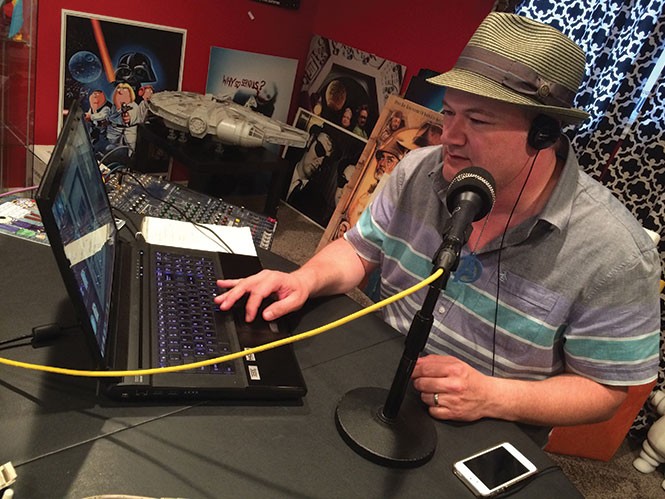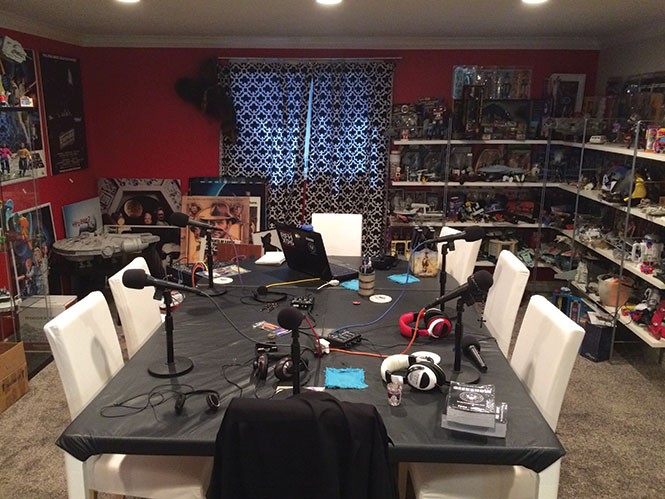Geek Show Podcast's Kerry Jackson
How the SLC radio host turned his basement into a pro studio
By Gavin Sheehan @TheGavinSheehanIn the landscape of podcasting, whether local or national, a good many creators are recording their shows out of their homes. They've scrounged up equipment from a pawn shop, a free editing program, a card table and some folding chairs, a couple of beers and some good friends—and they have a show.
If you're an avid podcast listener, probably 75 percent of the shows you listen to might be made this way. But when a podcaster has more than 25 years broadcasting experience under his belt and a top-ranking morning show to your name, that casual approach just doesn't cut it for quality recording.
X96 Radio From Hell co-host Kerry Jackson launched the Geek Show Podcast in April 2008 in much the same manner—talking nerdy news with his trusted friends over shots in his basement. Jackson needed to take the show home due to his then-owner Simmons Media only having one studio that could do a multiple microphone setup: the X96 studio. With that space used for broadcasting 24/7, he sought out the next best alternative, which eventually came as a suggestion from his wife: to record it at home. After working out the kinks, the show's schedule was established to record three episodes in a long session every three weeks, with weekly "broken news" spots from those who could join Kerry on their free time.
But as is the case with most home recordings, problems persisted in the form of background noise. The sessions were recorded beneath the kitchen, so there were challenges when people were overhead. After years of having the studio setup in the basement—surrounded by toys and other geeky memorabilia—both Kerry and his wife Suzanne decided to remodel the lower half of their home. And with that came the opportunity for improvements for the show in the form of a brand new studio space.
They knocked down walls and made one large room for the studio, says Kerry. His wife "thought of most of it, actually. She said, 'You sometimes have people over to observe, so you should have seating in there somehow.' So we got some couches over there for a private audience to come over and watch," Kerry says.
When the renovation was underway, they worked with what they had available in the house and improvised along the way. They replaced everything they could to make the room better for both recording and the comfort of the panelists. The table they record on is a customized Ikea office table, with a hole in the center for cords and a Velcro vinyl top for easy cleanup. Thicker insulation was added to the west wall to block noise from adjoining rooms and hallways. The main challenge to this new studio space was ventilation, needed to heat and cool the room, with the furnace directly next to the studio.
In the end, Jackson had created one of the best home studios he could construct.
One of the more interesting highlights to recording sessions is that even with all the measures made to soundproof the room, Jackson still plays music in the background that can be subtly heard. It's a conscious choice made for conversations.
"It's a very simple equation: You've been to a party where there's no music, and you've been to one where this is music," Jackson says. "The one where there is music, people are talking. It feels like a meeting if you don't have music. You put on music, everyone relaxes a bit. It also helps with the image, because I've created a special channel with punk, ska and rap. It helps the mood along."
While he was able to make substantial improvements for his own show, Jackson recognizes that not every podcaster is able to make major changes to improve recording quality. However, he still hears shows to this day recorded with people over Skype, and bad microphone setups that would make any listener cringe. To those who are passionate about making a podcast, Jackson offers a few simple words of advice:
"It really baffles me," Jackson says. "I think if you're going to do [a podcast] on a regular basis, you really need to have a place that you can do it. But if you're doing a podcast and you're daisy-chaining it that way, it's just not listenable, and you're losing listeners.
"You should really dedicate a space, whether it's your living room or whatever, but just make sure at that time everybody knows this is what we're doing. It will just sound better, more professional, and you'll actually get a better show out of it. When you have better shows, you get more people listening. And that's really the key, right?"
More by Gavin Sheehan
-
Gavin's Underground: End Of An Era
Nine and a half years of local entertainment blogging comes to an end.
- May 26, 2017
-
Torris Fairley
A quick interview with the up-and-coming SLC-based comedian.
- May 25, 2017
-
Cirque Asylum
A look into the dance school teaching unique forms of aerial arts.
- May 24, 2017
- More »
Latest in Arts & Entertainment
Readers also liked…
-
New TV for January 2023
Mayfair Witches, Velma, The Last of Us, Poker Face and more premieres
- Jan 4, 2023





